Home
Matera Cielo Stellato 2025
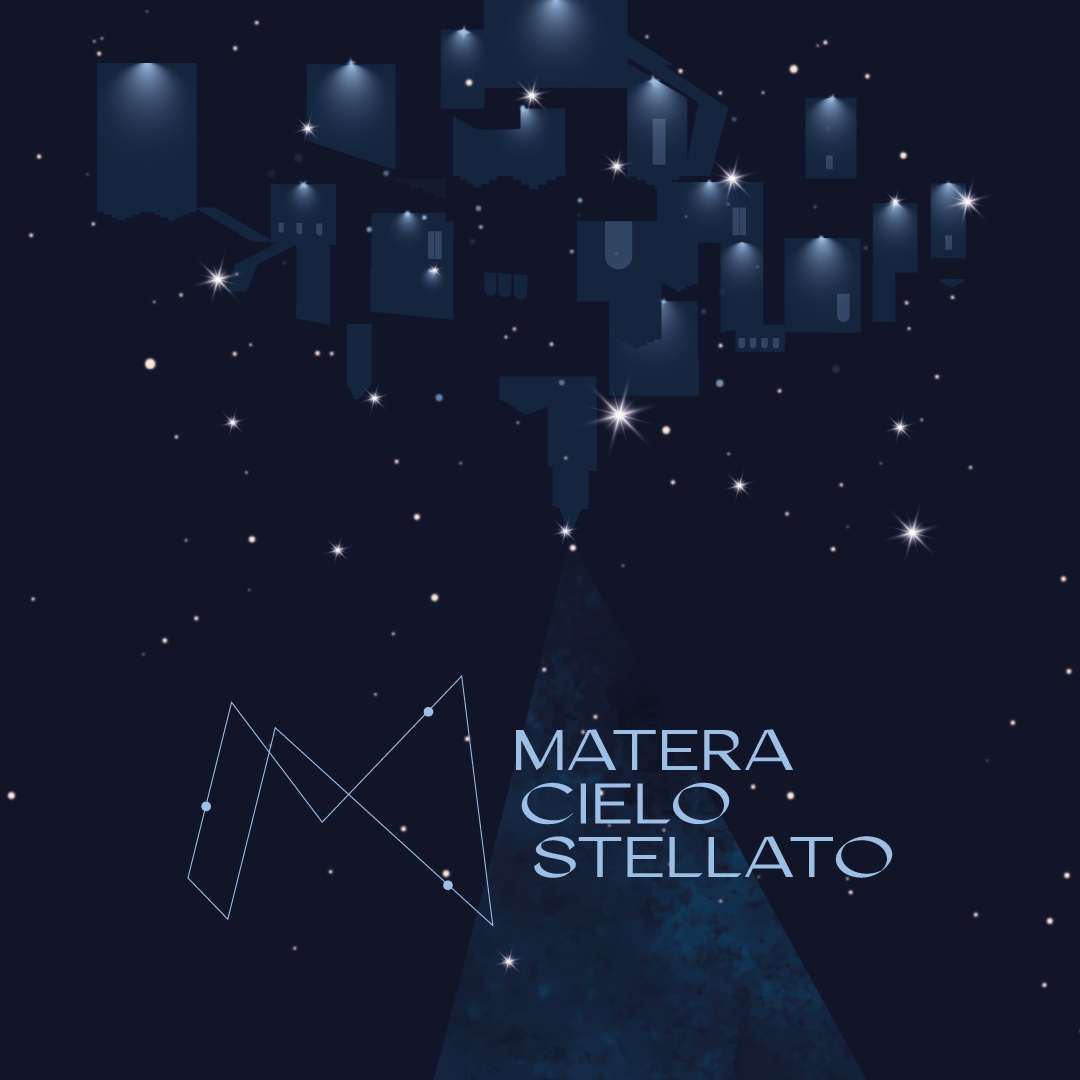
- Immagine condivisione Facebook:
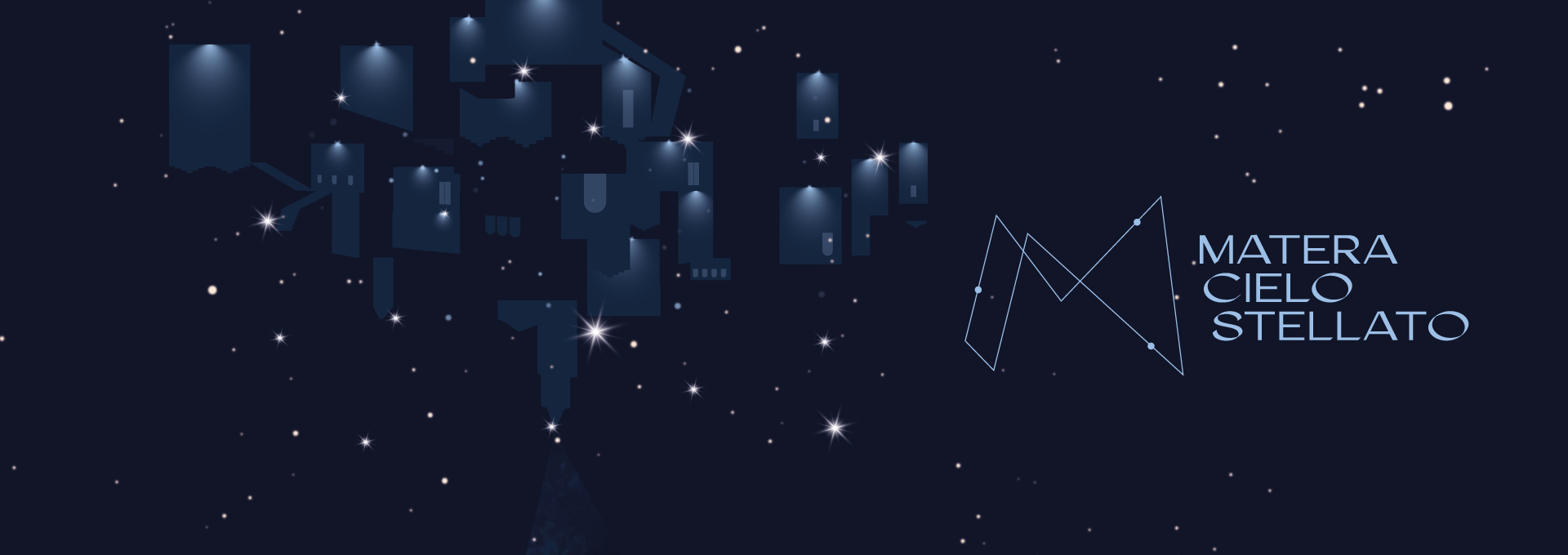
L’appuntamento con la nuova edizione di Matera Cielo Stellato, l'azione collettiva che spegne le luci nei Sassi e accende la meraviglia, trasformando il cuore della città in uno spazio condiviso di contemplazione e ascolto, è per sabato 27 settembre 2025 a partire dalle ore 19:30.
L'evento coinvolge strade, abitazioni e vicinati del Sasso Barisano nel cuore della Città dei Sassi di Matera, in un dialogo visivo tra il paesaggio urbano e il cielo.
Per tutta la durata dell’evento è interdetto il traffico veicolare nell’area, ma resta consentito il passaggio pedonale. Cittadini e visitatori possono assistere al rito da uno dei numerosi affacci panoramici oppure immergersi nei vicoli del Sasso Barisano, percorrendoli a piedi tra migliaia di candele e piccole luci.
Per ragioni di sicurezza e di regia, piazza Duomo è temporaneamente chiusa al pubblico. La regia dell’evento si sviluppa infatti proprio da piazza Duomo, da cui parte il flusso sonoro e narrativo che accompagna l’intera esperienza.
La colonna sonora è affidata al pianoforte elettrico di Chiara Lacertosa, mentre la voce narrante dell’attore Antonello Vivilecchia guida il pubblico in un percorso di memoria e immaginazione.
Musica e parole si alternernano in un intreccio delicato e potente: da un lato, brani selezionati per evocare atmosfere di sospensione e ascolto; dall’altro, letture storiche che raccontano come questo rito di luce abbia segnato, in epoche diverse, momenti significativi della vita collettiva materana.
Per i testi in lingua araba, è la voce di Naziha Fehri ad accompagnare il pubblico, intrecciando la dimensione poetica dell’evento con il respiro mediterraneo del 2026.
L’accensione dei lumini è annunciata – come accadeva anticamente – da uno squillo di tromba, a cura del musicista Gianpaolo Matera.
Tra i testi proposti anche un estratto da "L’homme qui venait du désert", poesia dello scrittore marocchino Tahar Ben Jelloun, tra i maggiori autori di lingua francese del mondo arabo. Il brano rende omaggio al legame con il Marocco e con Tétouan, città che condivide con Matera il titolo di Capitale Mediterranea della Cultura e del Dialogo 2026. Il deserto è raccontato come paesaggio interiore, fatto di silenzi, città sommerse e notti inespugnabili: un’immagine che richiama le Terre Immerse del Mediterraneo interno.
A questa voce si affianca quella della poetessa araba Nāzik al-Malā’ika, con il brano" «ويبقى لنا البحر» (E ci resta il mare)", che viene letto in lingua originale. Il mare, in questi versi, riflette i colori del cielo e cambia come i sogni e i pensieri: un’immagine che entra in risonanza con Matera Cielo Stellato, dove la città si trasforma in una costellazione rovesciata, specchio del cielo.
Non si tratta soltanto di un appuntamento simbolico o suggestivo: Matera Cielo Stellato è un gesto civile e poetico che, tra luci soffuse e silenzi ritrovati, prepara la città a un nuovo anno da capitale, rendendola ancora una volta laboratorio di cultura, visione e comunità.
L’evento è promosso insieme al Comune di Matera e si inserisce nel percorso di avvicinamento a Matera Capitale Mediterranea della Cultura e del Dialogo 2026.
Matera Cielo Stellato® è un marchio registrato di F. Foschino, S. Tarasco e V. Cappuccio.
Ringraziamo l’Arcidiocesi di Matera-Irsina per la preziosa disponibilità offerta per la realizzazione dell’evento.
Il video di Matera Cielo Stellato 2025
From Tirana to Matera: Building a Mediterranean Cultural Future Together
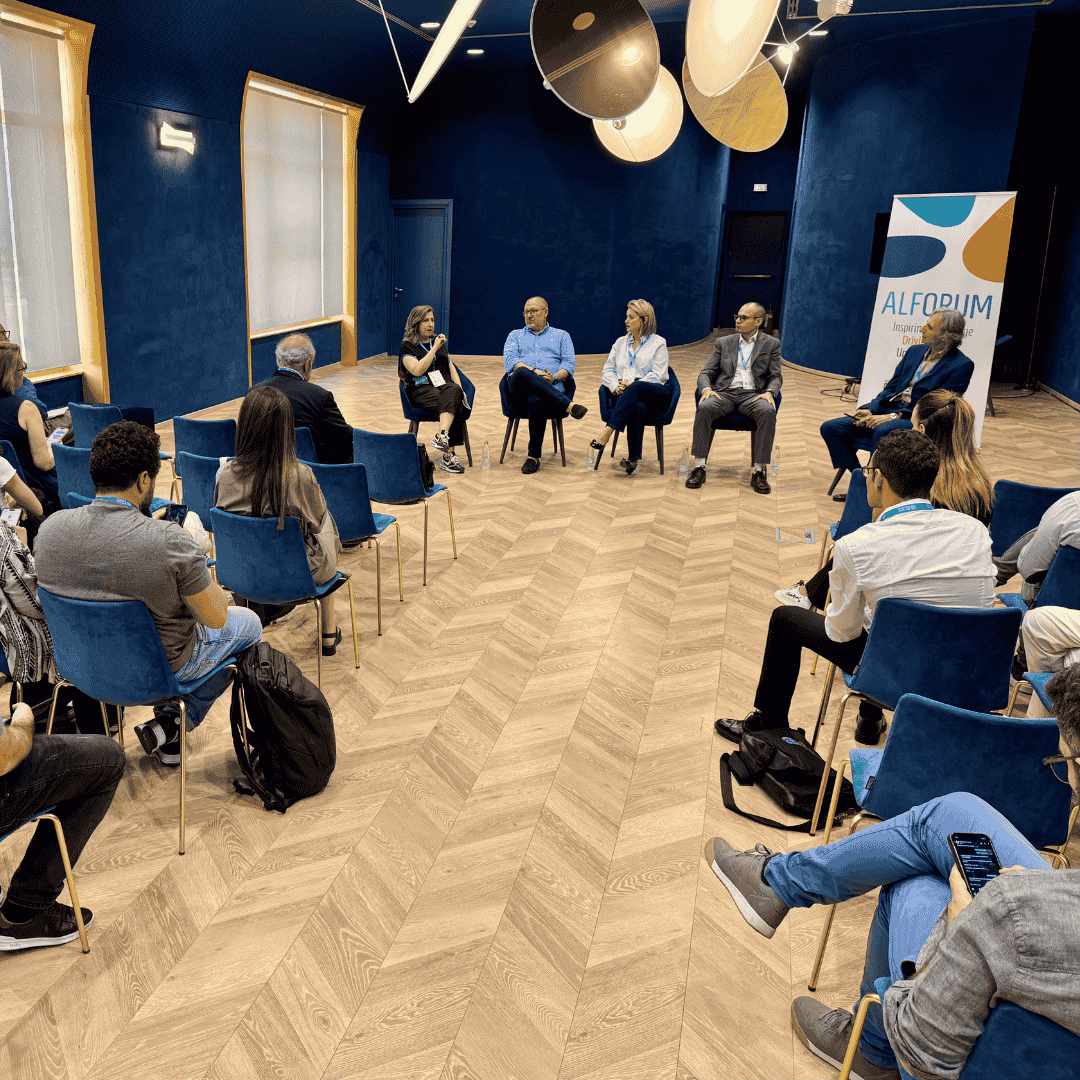
We recently took part in the ALForum 2025 in Tirana, a special and deeply meaningful event for the future of cultural dialogue across the Mediterranean. For us this was another important step toward Matera 2026 – Mediterranean Capital of Culture and Dialogue. It’s a journey we are embracing with passion, responsibility, and a shared vision.
The Anna Lindh Foundation Forum, organized by the Foundation itself—one of the key promoters of the MCCD title along with the Union for the Mediterranean—was hosted in Tirana, the current Capital for 2025, from June 18 to 20. This year’s edition carried a special significance: it marked 20 years of the Anna Lindh Foundation and 30 years since the launch of the Euro-Mediterranean Partnership—two crucial milestones in the effort to build a Mediterranean region grounded in peace, cooperation, and intercultural dialogue.
The Forum unfolded across three symbolic locations in the heart of Tirana: Skanderbeg Square, transformed into a vibrant open space for performances, installations, and public activities; the National Theatre of Opera and Ballet, where the plenary sessions and official meetings took place; and the International Hotel, which hosted a wide range of parallel sessions, working groups, and networking opportunities. In total, there were over 100 thematic sessions, 500 speakers, 90 artists, and 15 artistic performances—a testament to the vibrancy and diversity of the event.
The Forum opened with a moving address by HRH Princess Rym Ali, President of the Anna Lindh Foundation, who reminded us of the Foundation’s role as a bridge between governments, civil society, artists, and citizens. Drawing on her rich background in media and journalism education, she highlighted the transformative power of arts and culture in building more resilient, cohesive societies and stressed how central intercultural dialogue is to the Mediterranean’s future.
Equally powerful were the remarks by Albanian Prime Minister Edi Rama, who spoke about the symbolic importance of hosting the Forum in Tirana. In a world marked by conflict and fragmentation, he reflected on a striking paradox of our time: “While our ability to communicate increases, our ability to listen decreases.” He reminded us of Albania’s own history of isolation and celebrated the richness of Mediterranean diversity as a source of strength. “Diplomacy doesn’t only happen in ministries—it also happens in cafés and schools,” he said. “To lose faith in diplomacy is to lose faith in humanity itself.” His message was clear: “The Mediterranean doesn’t need saving. It needs to be heard.”
During the official session dedicated to the Mediterranean Capitals of Culture and Dialogue, held at the Opera House, we had the chance to present “Terre Immerse”, the cultural programme that will define Matera 2026. Representing our Foundation, Rita Orlando, Head of Programmes and Networks, joined a panel moderated by Elie Melki (BBC Arabic), alongside speakers from Tirana, Alexandria, and Tetouan.
We shared our perspective: that the Mediterranean is not only a sea—it is also its inland territories, its silent landscapes, and its hidden histories. From this belief, we launched a new proposal: the creation of a Mediterranean Cultural Cities Network, bringing together experiences from European, African, and Middle Eastern capitals of culture into a shared cultural geography.
Matera is ready to play its part as Mediterranean Capital of Culture and Dialogue in 2026. With the project ‘Terre Immerse’, we want to give voice to the inland areas of the Mediterranean, to create beauty, foster dialogue, and build new connections in often marginalised regions. From Tirana, we launched a constructive challenge: to unite Mediterranean cultural cities into a stable network of cooperation and exchange.
Being part of the ALForum not only reinforced Matera’s international profile following the success of European Capital of Culture 2019, but also reaffirmed our commitment to positioning the city as a platform for cooperation between Europe, Africa, and the Middle East. We continue our journey, convinced that culture can be the space where transformation begins—and where shared futures take root.
Talk di Studio Azzurro a Matera per il Progetto AIRFARE
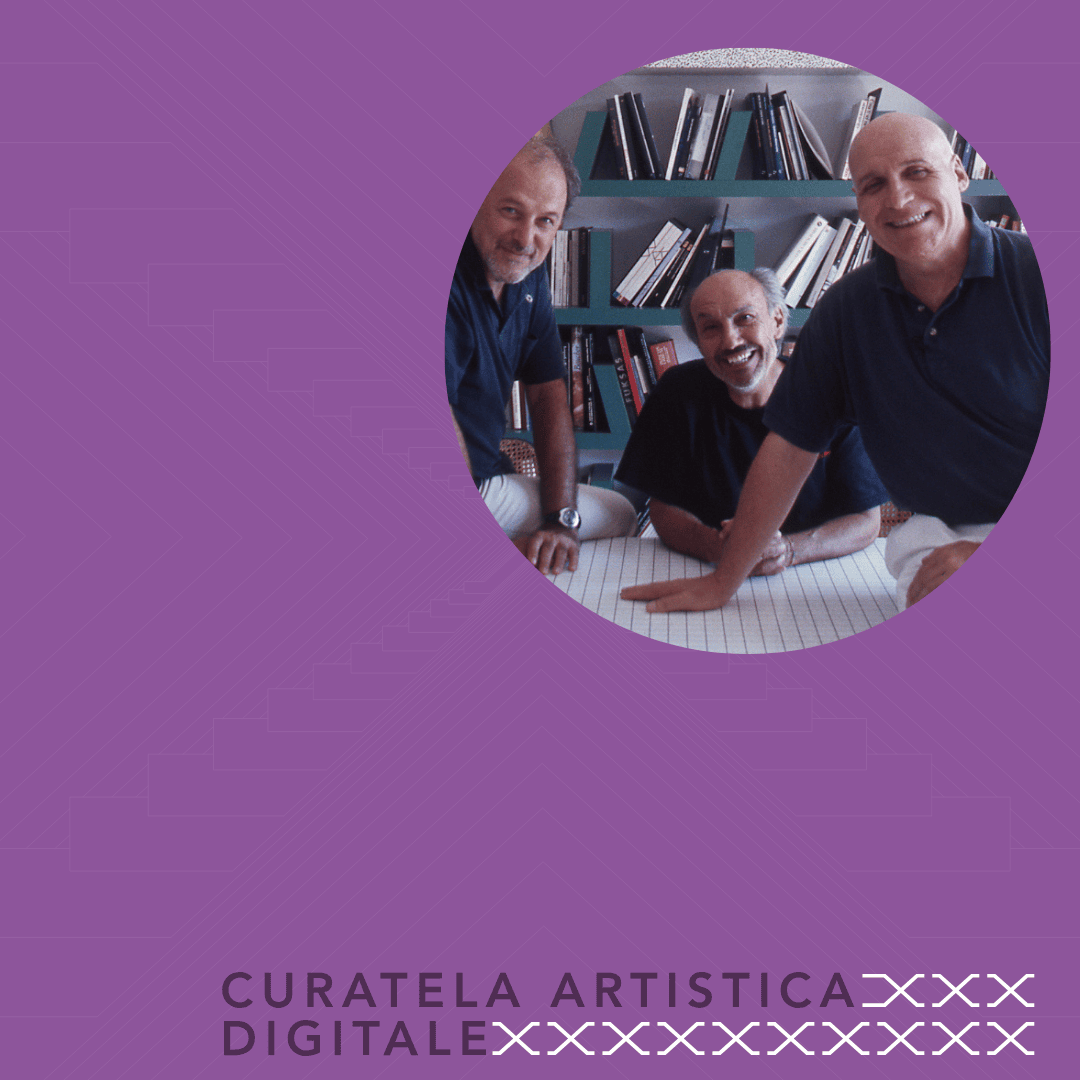
- Immagine condivisione Facebook:

- Immagine 1:
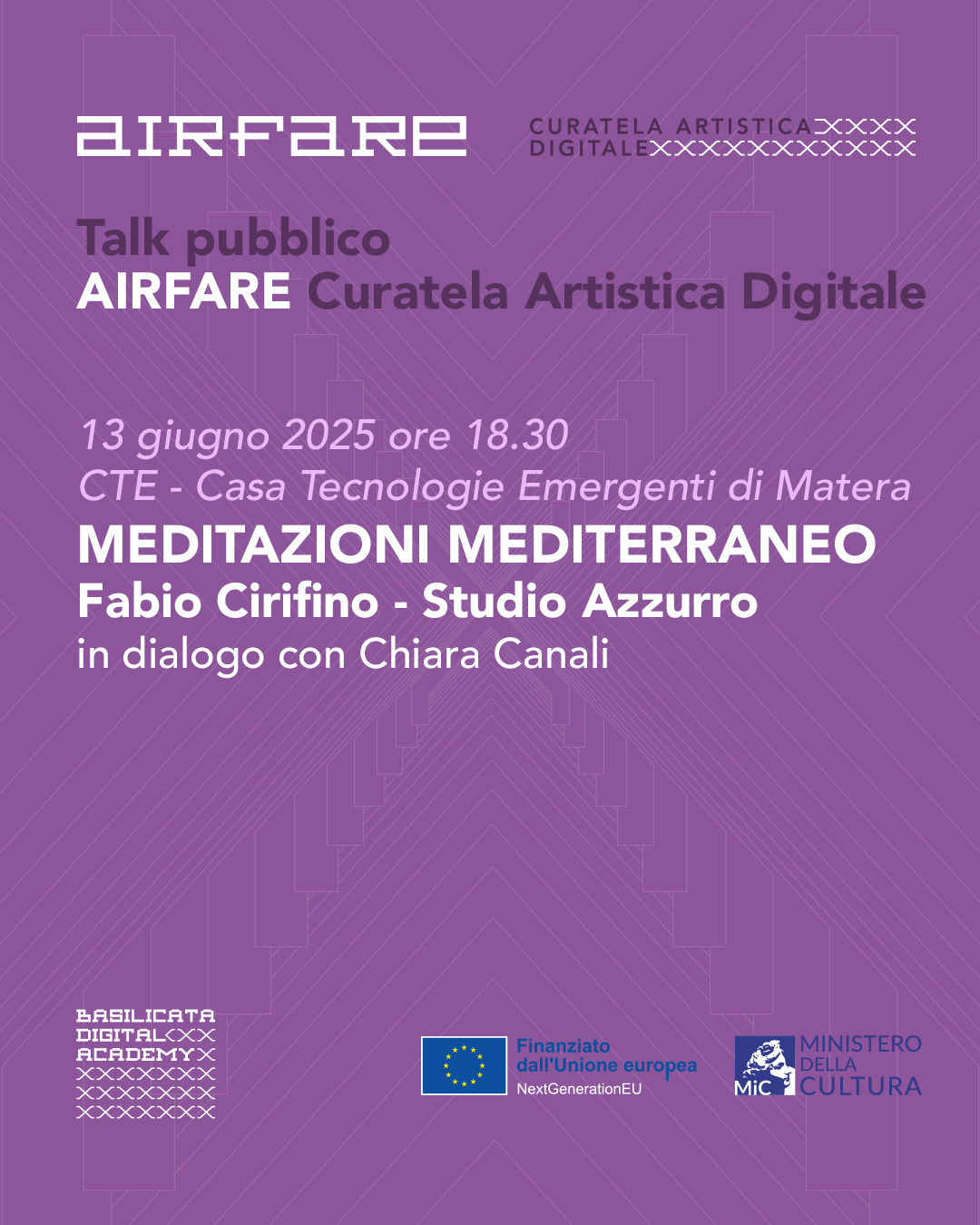
Venerdì 13 giugno 2025 ospitiamo il talk “Meditazioni Mediterraneo”, un incontro d’eccezione con Fabio Cirifino di Studio Azzurro e la curatrice Chiara Canali, Direttrice Scientifica del percorso formativo sulla “Curatela Artistica Digitale”, nell’ambito del progetto AIRFARE.
L’incontro, aperto al pubblico, si terrà alle ore 18:30 presso la Casa delle Tecnologie Emergenti di Matera (Via San Rocco, 1), e, per chi non potrà essere presente, sarà trasmesso anche in streaming sul nostro canale YouTube.
Il talk guiderà il pubblico attraverso la storia di Studio Azzurro, esperienza artistica fondata a Milano nel 1982 da Fabio Cirifino, Paolo Rosa e Leonardo Sangiorgi, che nel corso degli anni esplora le possibilità poetiche ed espressive delle nuove culture tecnologiche.
Un’occasione imperdibile per approfondire l’evoluzione delle pratiche artistiche digitali e il loro impatto sul panorama culturale contemporaneo.
Dagli esordi negli anni Settanta fino allo sviluppo dei primi videoambienti come Il nuotatore (va troppo spesso ad Heidelberg) del 1984, dagli ambienti sensibili come Tavoli (perché queste mani mi toccano) del 1995, ai percorsi museali, dalle performance teatrali ai film, Studio Azzurro disegna un percorso artistico trasversale alle tradizionali discipline e forma un gruppo di lavoro aperto a differenti contributi e importanti collaborazioni con il Gruppo Memphis, con Piero Milesi, Giorgio Barberio Corsetti, Giorgio Battistelli, Moni Ovadia e molti altri.
Con gli anni Duemila il bisogno di un confronto con il territorio fa orientare la progettazione verso mostre e narrazioni museali, offrendo una nuova modalità di fruizione per temi legati alle comunità territoriali e alla valorizzazione della loro memoria. In questo contesto si inserisce il progetto “Meditazioni Mediterraneo” dove assume un ruolo particolare l’attenzione al Mar Mediterraneo, oggi ancor più significativa in relazione alla recente nomina di Matera a Capitale Mediterranea della Cultura e del Dialogo 2026.
Dal 2002 al 2014 Studio Azzurro avvia un lungo viaggio lungo le sue sponde in cerca dei tratti comuni e delle tessiture di genti e culture di una straordinaria civiltà. Meditazioni Mediterraneo è una ricerca che, tra le differenze, coltiva l’idea di una comune identità stratificata, costituita da elementi primari: materie, suoni, colori, odori, gesti, processi, relazioni del Mediterraneo. Attraverso un itinerario nei sensi e nei territori emblematici di un’area geografica ricca di culture, religioni e costumi – Italia, Grecia, Francia, Marocco e Siria –, nascono scenari che diventano attivi e possono essere agiti dagli spettatori nell’ottica propositiva che: “il Mediterraneo è un divenire, una speranza, non solo una radice” (Adonis).
Numerosi artigiani al lavoro sono stati filmati nel corso dei viaggi di ricerca che Studio Azzurro ha intrapreso per realizzare le installazioni del ciclo Meditazioni Mediterraneo. Liutai, pescatori, sellai, fonditori, vetrai, cesellatori, vasai, tessitori, raccoglitori di olive, vinai, costruttori di barche, restauratori, rilegatori, maniscalchi, conciatori, fabbricanti di bambole: ripresi nel proprio ambiente di lavoro con il primo piano delle mani, intrecciano un racconto dei gesti e dei suoni generati nel creare i manufatti.
L’insieme di questi frammenti è rimasto nella memoria di Studio Azzurro come un grande affresco che ha dato vita alla installazione visiva e sonora Il colore dei gesti (Sinfonia Mediterraneo), una riscrittura musicale dei rumori generati dall’incontro tra materia modellata e gesti ripetuti attraverso i secoli, come un ritmo che segna l’intero territorio affacciato sul Mare Nostrum.
Il talk “Meditazioni Mediterraneo” si inserisce nel progetto AIRFARE – mediA dIgital libRary oF lucAnian cultuRE, sostenuto dal Ministero della Cultura nell’ambito del bando TOCC. L'obiettivo è accompagnare la transizione digitale delle industrie culturali e creative lucane, valorizzando al contempo il patrimonio culturale come spazio dinamico di sperimentazione, innovazione e produzione condivisa.
All’interno di questo contesto, il percorso dedicato alla “Curatela Artistica Digitale” rappresenta una delle azioni più innovative e sperimentali: un’offerta formativa unica in Italia, pensata per sviluppare nuove competenze legate al ruolo del curatore digitale, capace di operare nell’ambito dell’arte generativa, delle tecnologie emergenti e dell’interpretazione creativa del patrimonio digitalizzato. Il programma prevede una serie di incontri formativi, workshop e atelier tematici, momenti di confronto peer-to-peer e talk pubblici, fino alla Summer School conclusiva prevista per il mese di settembre 2025.
live streaming / 13 giugno 2025 / ore 18:30
First Visit of the Advisory Committee of Matera Mediterranean Capital of Culture and Dialogue 2026:
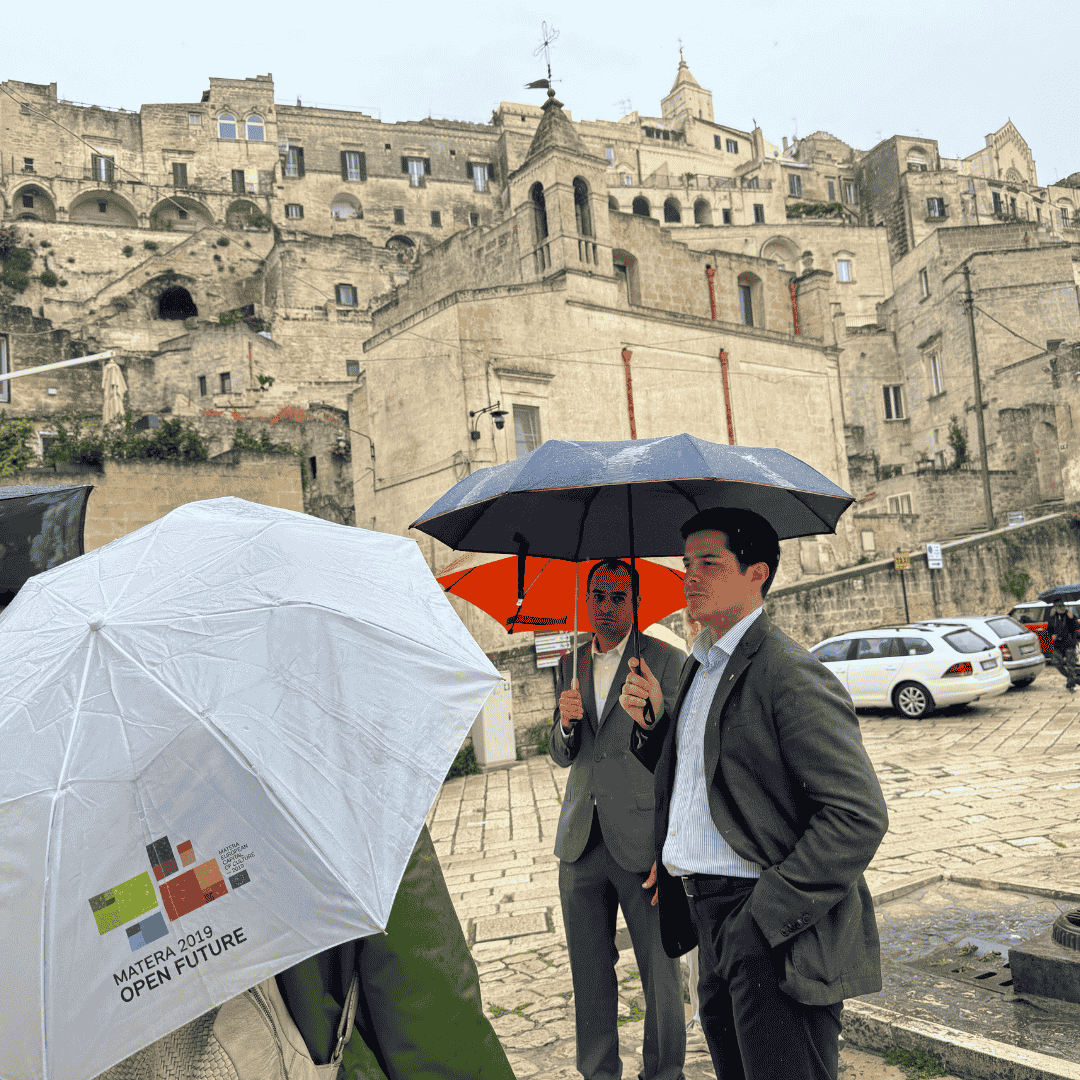
On May 15–16, 2025, Matera welcomed the first official visit of the Advisory Committee of the Mediterranean Capital of Culture and Dialogue 2026. The city had the opportunity to present its commitment and the vision behind the Terre Immerse project through institutional meetings, cultural visits, and working sessions. The visiting Committee members were Ayman Elsherbiny, analyst in the Cabinet of the Secretary General of the Union for the Mediterranean, and Alessandro Lamonica, Director of the Public Policies Unit at the Anna Lindh Foundation.
The visit began with a meeting with the Board of Directors of the Matera Basilicata 2019 Foundation. The Advisory Committee expressed appreciation for the progress already made and for the well-structured network of stakeholders. It was a solid starting point that allowed the discussion to move straight into the implementation phase for 2026 and reaffirmed how the legacy of Matera 2019 continues to generate long-term vision and value.
Traces of Dialogue Between History and the Present
One of the most evocative moments of the visit was the stop at the Diocesan Museum, where a 16th-century Arabic edition of the Gospels offered a powerful symbol of interreligious dialogue. In the Cathedral, a sculpted capital depicting a Muslim, a Christian, and a Jew captured the Committee’s attention with its message of peaceful coexistence. These are tangible reminders of a shared history of exchange and coexistence—testimonies that Matera still preserves and interprets.
During the walk through the Sassi districts, the Committee was introduced to two meaningful examples of local hospitality: one rooted in inclusive craftsmanship and the employment of people with disabilities, and the other combining boutique accommodation with cultural production. To mark the occasion, they were gifted a papier-mâché bell handcrafted by the social cooperative Oltre l’Arte—a symbolic object that embodies the idea of cultural transhumance, one of the cornerstones of Matera 2026.
Terre Immerse: The Project for 2026
The public highlight of the visit took place at the Chamber of Commerce, where the broader Mediterranean Capitals of Culture and Dialogue program was introduced. After reflections on the ongoing experiences in Tirana and Alexandria, the spotlight turned to Matera and the Terre Immerse project, outlining its key themes, goals, and the opportunities it will create for the city and the wider region.
The second day focused on education and research. The Committee met with the Institute of Religious Studies of the Pontifical Southern University to discuss future collaborations on theological and interfaith dialogue. Later, they engaged with the University of Basilicata, learning about ongoing Mediterranean-focused projects: archaeological excavations in Tétouan, ethnomusicological research, studies on migration, and cultural heritage conservation. A rich constellation of perspectives that could further enrich the 2026 program.
Working alongside the Matera Basilicata 2019 Foundation team allowed for in-depth discussion on strategies, tools, and program development, with special attention to partnerships and community participation. This first visit helped shape the roadmap ahead, which will include a follow-up mission to Tétouan and a return to Matera later this year to assess progress.
A Path That Connects
This inaugural visit marked a key milestone—not just for Matera, but for the entire initiative. It was a moment in which words, visions, and intentions began to take shape as shared actions. A Mediterranean that speaks not only through voices, but through its symbols, its stones, and the gestures that continue to point toward the future.





